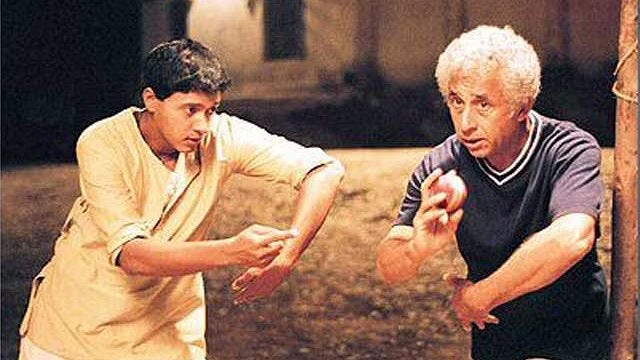To understand what are the fundamental skills of cricket, players and their parents must first clear the cloud surrounding the game.
Cricket is a game that demands intense physical strength. But players can’t win matches by relying simply on physical strength. Cricketers are expected to work on building physical fitness and equally sharpening mental strength. Why so?
This is because cricket is a technical game. Only the right balance of mental and physical fitness is what makes an individual a cricketer. The key areas- batting, bowling, fielding, and wicket-keeping heavily rely on strategic thinking and demand the knowledge of science and art complementing each other.
Hence, players are needed to learn a few fundamental skills of cricket that support their physical and mental skills for the sport.
And because these are basic skill sets, the earlier players start learning them, the faster these skills can be turned into muscle memory.
So, today let’s introduce you to a few fundamental skills of cricket that every player regardless of gender and age, must start building right away. Grassroots players hear us out!
What are the fundamental skills of cricket?
Inevitably you’re bound to come across some skill sets that are overlapping while some are unique to a certain segment of the game.
So, let’s first discuss the skill sets that tend to overlap all segments of the game:
Reflexes and Timing
Reflexes create a major impact on batting but can be a game-changer for bowlers and fielders. This is even more true for wicket-keepers and slip fielders. Because timing is everything in cricket, your reaction time will determine the short or the wicket.
Setting up a bowling machine or shortening the pitch while practicing can help in building strong reflexes and timing the ball. Batters can prepare to hit balls from closer distances and practice running between the wickets as soon as the ball touches the bat.
Coaches can start with a tennis ball to improve reaction while instilling confidence in players.
Concentration & Focus
Concentration is another technique that’s useful for all cricket players to adapt to the fast pace of the game. For a batter the first few deliveries are easy to focus on, the main challenge is to stay focused for a longer period and score runs for the team. For the fielder too, the initial stretch of the match could feel monotonous and lead to losing interest and later cost a catch.
Resting is the first remedy to build focus. Visualization techniques or mental imagery is also a successful technique suggested by many sports psychologists.
Hand-eye coordination
Tracking the ball throughout the match is vital. The body must react instantly when the ball approaches the bat or a fielder. Hand-eye coordination is essential for a batter and fielders.
Some quick ways to build this skill is by practicing other sports such as tennis and boxing. Another way batters can ace the skill is by practicing slow-paced underarm deliveries and slowly transitioning to faster deliveries
Strength and Balancing
As we mentioned before, cricket needs physical strength and mental power to win matches. But cricket doesn’t demand a heavy-weight champion.
Cricket needs players who can balance and bear the weight of a bat and ball. Balancing is equally important when building strength. Moving quickly and swinging the bat also needs the body to be poised. Moreover, batters are also trained to be quick; they should be able to accomplish running between the wickets faster and fielders can’t miss a single second in throwing the ball back toward the wicket.
Practicing in the nets and managing the speed of deliveries can help. A technically right exercise routine supports constructing an agile and flexible body that is not too heavy or too thin to hit with a bat and catch a ball.
Muscle memory
Practicing any skill set over and over again leads to muscle memory. It comes with time and slowly gets itched in the subconscious mind, for instance, swimming and cycling.
It’s the same case with cricket. Any skill that needs your attention also needs practice. And practice can help build muscle memory. Once a skill is installed in the mind, batters can subconsciously hit any cricket short at that point.
Now, we’ll try to decode a few key fundamental knowledge and skill sets for Batting, Bowling, Fielding, and Wicket-keeping separately.
Fundamental skills of cricket Batting
Batting is a strenuous job and takes a lot of strength, specially in long-haul matches. Scoring a fifty or closing a century is no joke–batters need to align their stamina with the right batting technique.
And it all begins with holding the bat right. Generally, the V-grip position works the best and is followed by most batters. Both hands’ V-shaped portions must face downwards. Fingers are placed in the middle with a two-finger distance between both hands.
Batting skills in cricket that one must start learning early:
- Strong wrist power
- Building stamina
- Running speed
- Bat speed
- Analyzing scores and statistics
- Hand-eye coordination
Batters also need to learn different types of shorts including:
A batter must know the basic batting skills in cricket too. These come with practice and correctly learning the sport. Situations like how to avoid legs, face yorkers, timing, and tackle aerial shorts; all come with time.
Do you want to record and share your batting score with others? Download CricHeroes
Fundamental skills of cricket Bowling
Similar to batting, bowling is an equally tiresome( sometimes more) job. Bowlers have a few overs and 6 balls in each over. The pressure at the end of each over and at the end of each inning is impossible to explain.
But great bowlers are the most lethal weapon a team can possess. Bowling is the most effective way to control runs and secure wickets faster.
There are mainly 2 types of bowling: Spin and Fast. You need to identify your bowling technique( what suits you best)/. And then for both types of bowling, one needs to get the basics right.
Bowling skills in cricket that ambitious players must work on:
- Throwing and catching
- The accurate and consistent run-up
- Create variations
- Strength, flexibility, and agility
Bowling also comes with technicalities on different styles of bowling. Bowlers should ace their choice of bowling category.
Additionally, bowlers must be well-versed in the rules and penalties of bowling. Especially take care of what not to do- wides and no-balls and what to do more often- allow the lowest runs in their over.
Would you like to start tracking your bowling performance online? Download Now CricHeroes
Fundamental skills of cricket Fielding
Sadly, fielding is taken casually by most players in the local clubs playing grassroots cricket, even though a fielder is expected to perform two key duties:
- Reduce the number of runs
- Catch the ball
To accomplish the two, a fielder needs to be trained and gain excessive exposure to playing matches to comprehend different situations.
Simple fielding skills in cricket:
- Catching and throwing
- Concentration( Because the chance of distraction is higher)
- Good hand and eye coordination
- Faster reflexes
- Building strength and stamina
Practicing catches and defending the boundary must be a daily routine when practicing, regardless of your core skill which could be batting or bowling.
Fundamental skills of cricket Wicket-keeping
The skill set to stand and catch the ball behind the stumps seems vague and just like fielding– often overlooked. Needless to say, the role of a wicketkeeper is significant and indispensable.
Whoever takes the onus of wicket-keeping must build the skill with practice. Each time the batter is unable to hit, touch or leave the ball the wicket-keeper must attentively grab the ball.
So, we can discreetly tell you 3 key areas that any aspiring wicket-keeper needs to ace:
- Hand-eye coordination
- Concentration
- Reflexes
Moreover, there’s one big part of wicket-keeping that’s hard to teach but can be built after years of practice- Courage. The courage to face high-paced balls that are more unpredictable than life.
But what’s the most fundamental skill of cricket?
No one can escape one fundamental skill of cricket, neither Sachin Tendulkar nor David Warner could- and that’s practice!
Practice not only makes a man perfect but also makes your cricketing skills sharper. The more you practice your core skills, the better you get at them. And the cherry on the cake is that you’ll be able to identify your strengths and weaknesses; apply or avoid them when the right time comes.
So, the earlier you get at net practice the better it is.
If you are a local player and aspiring for big dreams, then we’d love to know what are the cricketing skills you found the hardest to learn. Tell us in the comments.
FAQs
Q: What is meant by the skills of cricket?
The skills of cricket refer to the specialized abilities and techniques needed to excel in various aspects of the game, such as batting, bowling, fielding, and wicketkeeping.
Q: What skills do you develop from playing cricket?
Playing cricket hones a diverse set of skills including hand-eye coordination, teamwork, strategic thinking, focus, agility, and physical fitness.
Q: What are some fundamental skills required for the game of cricket?
Key fundamental skills of cricket encompass catching, throwing, ground fielding, anticipation, and quick reflexes. These abilities are pivotal for effective performance on the cricket field.
Q: What qualities are essential to succeed in cricket?
To achieve success in cricket, qualities such as determination, discipline, perseverance, adaptability, and a strong work ethic are crucial. These attributes contribute significantly to becoming proficient and triumphant in the sport.
Q: What are the three fundamental skills every batsman must master?
Every batsman must master three fundamental skills in cricket: footwork, shot selection, and timing. These skills are the cornerstone of a batsman’s ability to consistently score runs.
Q: Is natural talent a prerequisite for cricketing skills?
While natural talent can provide an initial advantage, cricket, like any sport, also demands dedication, hard work, and continuous practice to refine the essential skills required for accomplishment.
I am Dhaval Jain, SEO All-Rounder at CricHeroes.
CricHeroes is an ultimate Cricket Scoring App and the world’s only true Cricket Network. With more than 30 million registered cricketers using CricHeroes to Live Score their Local Cricket Matches and Tournaments, CricHeroes is already the number one Cricket Scoring App in the world!










